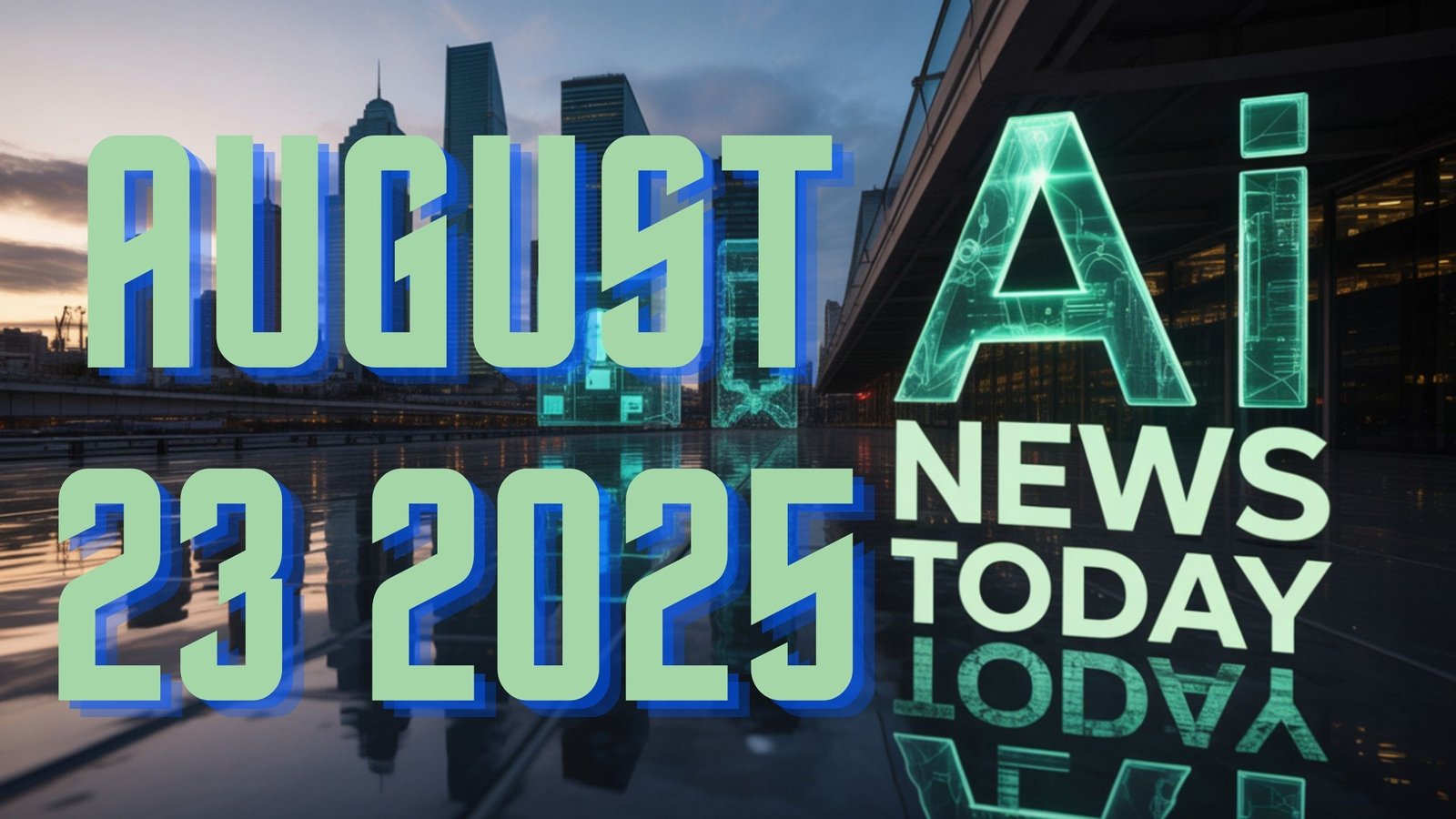AI News Daily — USA (Saturday, August 23, 2025)– Artificial Intelligence continues to redefine the global economy, workforce dynamics, national security, and the competitive tech landscape. On August 23, 2025, we see pivotal developments shaping how the United States leverages AI for productivity, defense, corporate innovation, and infrastructure investment. Below, we present a detailed analysis of the day’s most significant AI news and its broader implications.
AI Driving a Sea Change in Workforce Productivity
AI adoption is fueling what experts describe as a “sea change” in productivity across industries. Companies in the S&P 500 are witnessing measurable improvements in efficiency, cost savings, and financial performance by strategically deploying AI-powered automation.
Rather than being viewed as a replacement for human intelligence, AI is serving as a force multiplier. Routine administrative tasks, data analysis, and customer support processes are increasingly handled by large language models (LLMs), generative AI platforms, and intelligent automation tools. This allows businesses to optimize human capital, reallocating employees to higher-value roles that require creativity, problem-solving, and emotional intelligence.
Corporate leaders note that this evolution means doing more with fewer resources. For example, leading financial firms report faster turnaround times in compliance checks, while logistics companies are leveraging AI-driven predictive analytics to reduce supply chain delays. The bottom line: AI is reshaping the very definition of workplace productivity in America.
U.S. Army Expands Use of AI in Defense and Operations
The U.S. Army is rapidly scaling up its use of artificial intelligence, particularly generative AI and LLM-based systems, to enhance operational readiness and battlefield efficiency. From vehicle repair diagnostics to threat detection and autonomous systems, AI is being integrated into nearly every layer of military operations.
The Pentagon has allocated hundreds of millions of dollars in contracts to AI research firms, defense contractors, and academic institutions. This investment supports:
- Predictive maintenance systems to minimize vehicle downtime.
- AI-driven surveillance and threat analysis to identify enemy activity in real-time.
- Generative AI assistants are providing soldiers with decision-making support in complex battlefield scenarios.
Military analysts emphasize that AI is no longer a support tool—it is becoming a core component of U.S. defense strategy. As adversaries increase their AI capabilities, the Army’s push ensures that the U.S. maintains a technological advantage in national security.
Meta Intensifies AI Talent War With Premium Hiring Packages
The AI talent war is escalating, with Meta Platforms Inc. aggressively recruiting top researchers, engineers, and developers in an attempt to catch up with industry frontrunners OpenAI and Google DeepMind. According to Google DeepMind’s CEO, Meta is offering unprecedented salary and benefits packages, some surpassing industry benchmarks by wide margins.
Meta’s strategy reflects both urgency and ambition. The company has faced criticism for lagging in generative AI breakthroughs, and leadership is determined to close the gap. By building a world-class AI team, Meta aims to bolster projects across its platforms, from social media algorithms to virtual reality (VR) and augmented reality (AR) ecosystems within the metaverse.
Industry experts argue that this talent arms race will determine which companies dominate the next wave of AI innovation. For Meta, the stakes are particularly high, as AI is central to both its future growth and its ability to compete in a crowded, fast-moving market.
Massive AI Infrastructure Investments Across the United States
The infrastructure backbone of AI is expanding at an unprecedented pace. In a landmark move, Google invested $9 billion into building advanced AI data centers in Oklahoma, while another $3 billion AI data center was planned for North Dakota.
These facilities are designed to support:
- Large-scale AI training for advanced models.
- Cloud computing services for enterprise clients.
- Energy-efficient data storage solutions tailored for AI workloads.
The strategic placement of these centers across the Midwest leverages affordable land, renewable energy sources, and access to robust internet infrastructure. Beyond immediate technological benefits, these projects will generate thousands of jobs, boost local economies, and strengthen U.S. AI capabilities against global competition, particularly from China and Europe.
Such large-scale investment reflects a growing realization: without infrastructure, AI innovation cannot scale.
Sam Altman Cautions Against AI Investment Bubble
While enthusiasm for AI continues to skyrocket, OpenAI CEO Sam Altman has issued a warning about the risk of an AI investment bubble. He noted that while AI is undeniably transformative, investor overexcitement may be driving unsustainable valuations across startups and venture-backed firms.
Altman’s caution resonates with historical parallels, drawing comparisons to the dot-com bubble of the early 2000s. He urged a measured approach, encouraging investors to focus on companies with real-world applications, sustainable business models, and scalable technologies.
Other industry leaders share mixed views. Some agree that inflated valuations could destabilize the sector, while others argue that high-risk capital is necessary to push innovation boundaries. Regardless, the consensus is clear: AI is revolutionizing technology, but financial discipline will be key to long-term success.
The Transformative Impact of AI on the U.S. Economy
The U.S. economy is at the forefront of the AI revolution. Analysts forecast that AI-driven advancements could contribute trillions of dollars in economic output over the next decade. Key benefits include:
- Enhanced productivity in manufacturing, finance, logistics, and healthcare.
- Accelerated R&D cycles allow companies to bring products to market faster.
- Improved customer experiences through personalized digital assistants and AI-powered platforms.
- New business models are emerging from AI-as-a-service (AIaaS) platforms.
At the same time, policymakers must navigate challenges around regulation, ethics, and workforce adaptation. Striking the right balance between innovation and governance will determine whether the U.S. remains the global leader in artificial intelligence.
Wrap Up: A Defining Era for Artificial Intelligence
The events of August 23, 2025, underscore how AI is becoming an inseparable part of America’s economic, defense, and corporate fabric. From the workforce revolution to Pentagon-backed AI initiatives, from Meta’s talent war to Google’s billion-dollar data centers, and from Sam Altman’s cautious warnings to the broader economic transformation, AI is shaping a new era of growth and competition.
As we move forward, one truth is undeniable: artificial intelligence is not just a tool, but the defining force of 21st-century innovation.

Selva Ganesh is a Computer Science Engineer, Android Developer, and Tech Enthusiast. As the Chief Editor of this blog, he brings over 10 years of experience in Android development and professional blogging. He has completed multiple courses under the Google News Initiative, enhancing his expertise in digital journalism and content accuracy. Selva also manages Android Infotech, a globally recognized platform known for its practical, solution-focused articles that help users resolve Android-related issues.




Leave a Reply